The Ultimate Guide to Gathering and Using Reviews
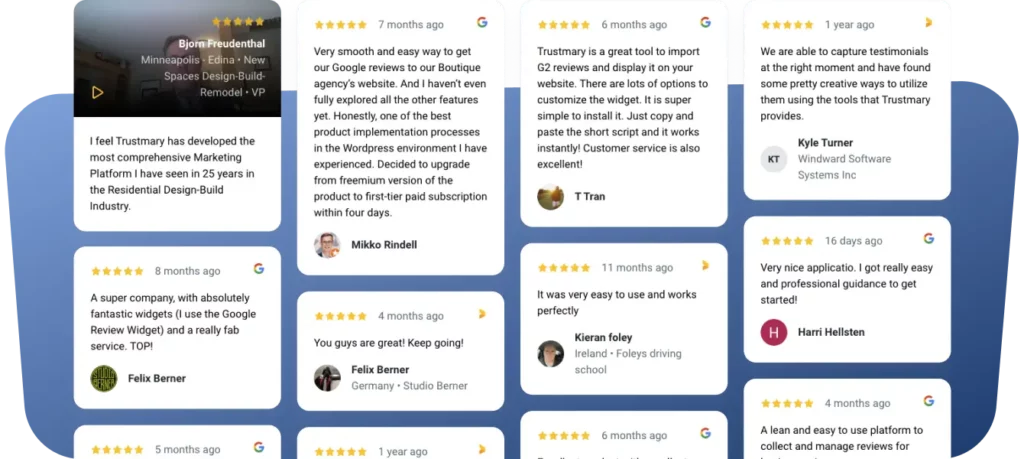
Have you ever wondered how other businesses get so many online reviews? I'll let you in on a secret. They ask their customers for them.
73% of people report that they write reviews for businesses.
19% say that they always leave a review if they are asked to do so, and 26% say they leave a review half of the time when they are asked.
Even though reviews are often seen as a B2C thing, B2B online reviews are as, if not more, important.
92.4% of B2B customers are more likely to buy a product or service once they have read a review about it. (How about you add a Google review widget to your website right now?
In this comprehensive article, we'll expand your understanding of reviews that matter as an effective marketing tool.
You'll learn how reviews affect your business, how you can collect more reviews, how you can use your reviews, and how you can manage the whole process easily.
Let's dive in!
The Power of Reviews: Make or Break Your Business
Think about the last time you wanted to buy a new phone (or any other product or service).
You've been loyal to the same brand for some years now, but are wondering if the new model from another brand would be better after all.
How would you approach your decision?
The typical consumer goes online to:
- compare different options and their key features
- compare prices
- read what other users have said (aka. social proof)
After their initial search, they'll most probably ask friends, family, and colleagues what kind of user experience they've had with the top two choices.
There are many factors that influence the purchasing decision (price, looks, whether you are happy with the current brand or not), but one of the most important factors is what other people you can relate to have thought about the product.
Especially with pricey investments, people tend to look for authentic reviews from multiple channels. YouTube, TikTok, and Reddit are filled with unpaid consumer reviews, and these are the ones we tend to trust the most.
And this does not go just for product reviews – you also need business reviews that build credibility for your brand itself.
Even a huge international brand such as Philips has realized the potential of having customer reviews as a part of its online presence.
"At Philips, we have gotten closer to the consumer by using user-generated content. We see an increased conversion whenever it is implemented in the consumer journey. We have a 180% buy-button increase and an organic search increase, and we get a lot of customer insights from our product reviews" Valerie Goncalves, Global Lead, Ratings & Reviews and UGC
Goncalves mentions three important factors that are made possible by asking for customer reviews and posting them:
- Significant buy-button increase
- Increase in organic search results
- Getting customer insights
Even though Philips is an international corporation, the same principles apply to small businesses as well.
5 Reasons Online Reviews Are Relevant in 2024
1. Online Reviews Increase Sales
When you have put in the work and created a well-functioning product or service, you need to post the most recent reviews alongside it to let others know what current users think about it. This will convince them that you are reliable.
Websites with customer reviews tend to outperform sites without them.
By adding customer reviews to your online marketing campaigns, you can get a whopping 270% increase in conversion.
This of course depends on your industry, product/service, and target audience. Here are some more results from specific use cases:
- Meal kit delivery company Ruokaboksi increased subscriptions by 37%.
- Roofing company Kattotutka got over 60% more contact requests.
- E-commerce brand Satokausikalenteri got 20% more sales with video reviews.
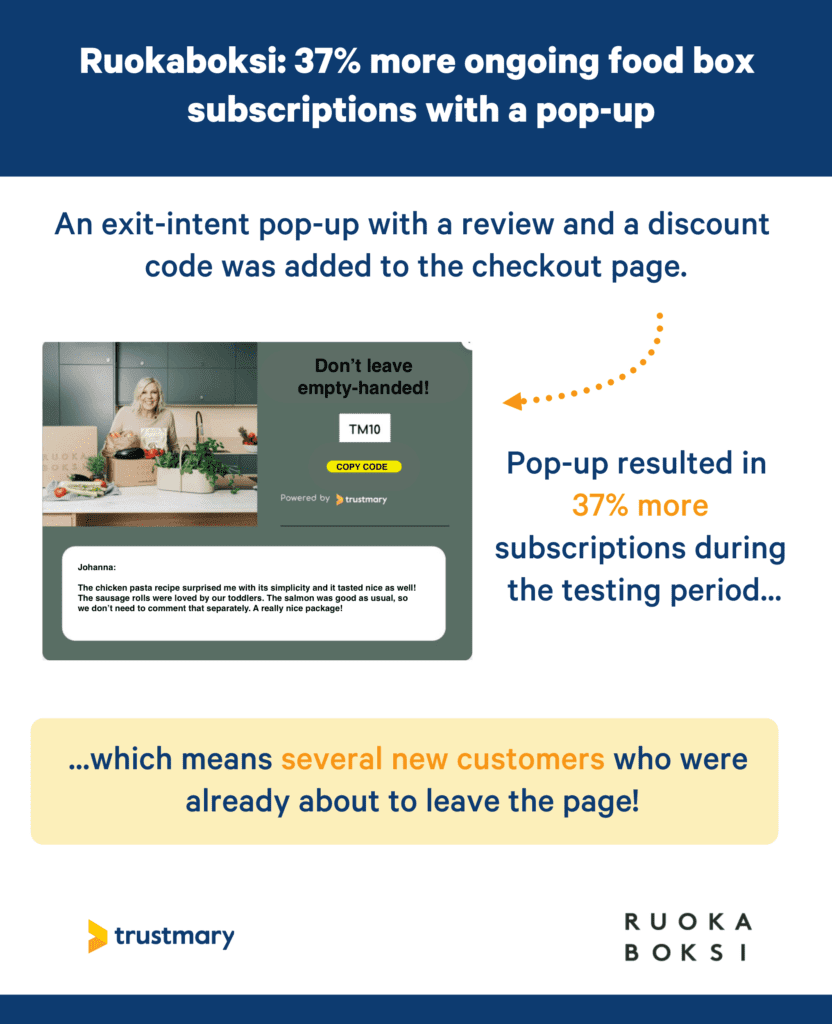
2. Reviews Contribute to 10% of Google Ranking
Reviews are a powerful SEO tool.
Having customer reviews on your site can make you rank higher on Google search, and increase your brand's visibility.
There are a few mechanisms through which it happens.
Google Maps Reviews for Local Businesses
Local businesses without any Google reviews have a hard time ranking well in the searches.
Let's take hairdressers and barbers as an example. Most towns have multiple salons that might not have an obvious competitive edge against each other.
If you are looking for a new hair stylist or barber, you would likely google establishments near you.
The three businesses with the most reviews and the best star ratings will appear in the "local pack" search results and steal your attention.
The rest you won't likely even take a look at.
Thus, you should always aim to have more and better reviews than your competitors if you wish to win over new customers through Google search.
Reviews on Your Website
Having reviews, and especially integrated review schema on your website makes a great difference for search.
Review schema helps you get your star rating show up on Google search results, which draws more attention to your link, potentially increases the click-through rate, and can increase your ranking.
Additionally, reviews include valuable information about your business, along with important keywords.
I have even seen in some of our customers' cases, that Google picks a review as the meta description of the link in search.
So imagine this:
A potential customer googles "pest control" and gets a set of search results.
Your link is in the top three results, and the description below your link says "Professional and affordable solution to my pest problem, I whole-heartedly recommend this service!"
It will immediately set you apart from your competitors that are blowing their own horn.
Having Reviews on Multiple Landing Pages = Duplicate Content?
We recommend our customers to add reviews to all relevant pages on their website.
Some of the SEO-focused readers might be concerned that this could be considered duplicate content and result in penalty from Google.
No worries.
According to Google's SEO Starter Guide that was updated in 2024:
"If you have content that's accessible under multiple URLs, it's fine; don't fret about it. It's inefficient, but it's not something that will cause a manual action. Copying others' content, however, is a different story."
According to this, there's no risk in having reviews on multiple landing pages.
Third-Party Review Sites and Platforms
In the consideration stage of the customer journey, many potential customers search for others' experiences with a brand they are considering.
This is when it's beneficial to have reviews on external review sites, like Yelp, G2, Tripadvisor, or other relevant sites. Trustmary also offers a external review page for your business.
These results pop to Google search results, and the potential customer can read reviews about your business.
So even if you don't necessarily get traffic to your own domain via these links, you still build trust and credibility.
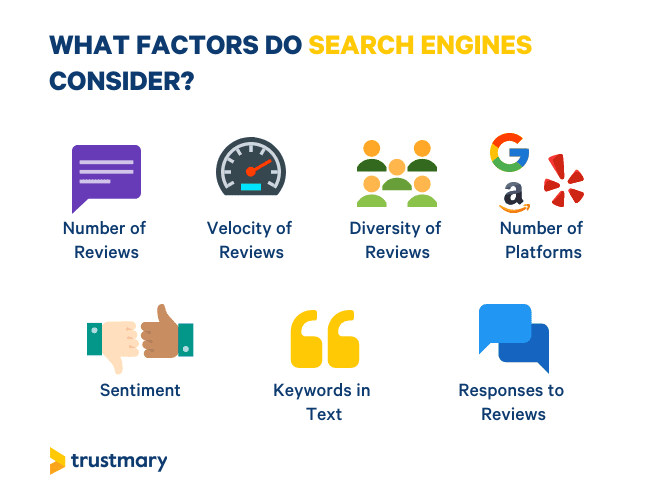
3. Your Ad Click-Through Rate (CTR) Improves
Your CTR lets you know how relevant searchers are finding your ads. If your CTR is high, it means that you are targeting the right people with the right kind of message.
CTR = Number of clicks your ad receives : the number of times your ad is shown
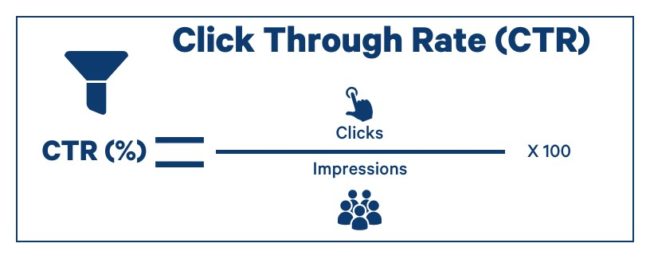
How are CTR and customer reviews connected?
According to a study done by BrightLocal, having a 5-star rating will get you 39% more clicks than having a 1-star rating.
If you can increase your rating from three stars to five, your CTR will increase by 25%.
To put it simpler: If you get people to click on your ad, you have a high chance of getting them to buy from you. After all, they were interested enough to click on the ad to end up on your website.
Note that any reviews won't do the trick. They have to be positive to increase your CTR. Especially local small businesses should be aware of having a lower rating than a three-star rating in Google Local Pack.
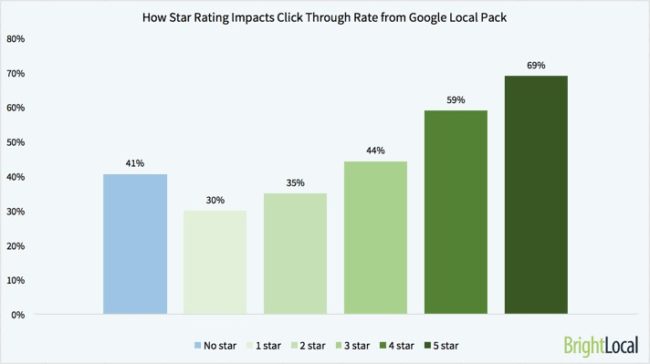
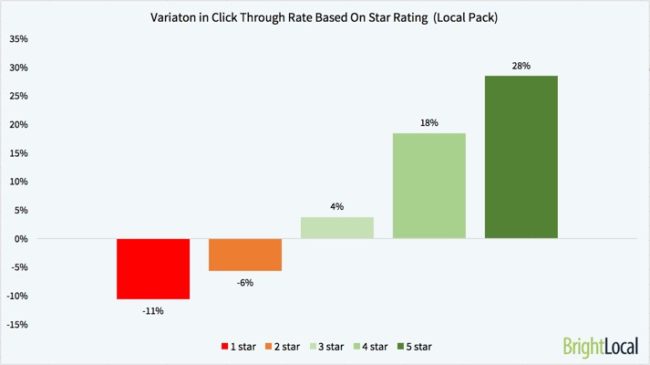
This chart shows the variance in CTR for different star ratings compared to having no stars at all.
If a company has a lower than a three-star rating, it's more beneficial to hide it from the Google Local Pack and to work on increasing that rating to be at least three stars.
4. Increase Reputation with Word-of-Mouth
When you aren't simply blowing your own horn, but letting your happy customers speak for you, you are creating a positive buzz around yourself. Word of mouth marketing (WOM) means that your customers are talking good things about you to their friends, relatives or colleagues.
A great American publisher and author William Feather pointed out already a century ago that everyone should praise themselves loudly.
"Blow your own horn loud. If you succeed, people will forgive your noise; if you fail, they'll forget it."
But an American actor, comedian, and cowboy, Will Rogers, had a better understanding of how to more effectively spread the word about your business.
"Get some else to blow your horn and the sound will carry twice as far."
Will Rogers
In the recent years, word-of-mouth marketing has become more and more popular among big and small businesses. Word-of-mouth marketing means that your customers are saying good things about you to their friends, relatives, or colleagues.
No matter if you are a corporate CEO or a small business owner, you should use positive reviews to boost your exposure on search engines. Building a reputation is crucial for small businesses and having reviews on your site and social media is a great place to start.
Curious about how word-of-mouth marketing is affecting your business? Read one of our free articles on +35 word-of-mouth marketing statistics.
5. You Get Valuable Customer Insights
Last but not least, what is a company that can't meet their customer's expectations?
Such company will not exist for very long.
It's extremely important to know what your customers think and how you could improve their experience.
Reviews, good or bad, provide clues on what you should do differently, and which things your customers love.
Some people are downright afraid of getting bad reviews. But they should be met with gratitude, as they teach you valuable lessons. A customer has taken time to tell you there is an issue so that you can do something about it.
Best Practices for Review Marketing
Review marketing is all about using your reviews in your marketing strategies. It entails collecting reviews and putting them to good use to build trust and get more customers.
The number of reviews, the overall rating, review sites, and responses to reviews all matter for your business.
While reviews can be easy to manipulate in 2024, reliable reviews and user-generated content are still unmatched marketing asset.
It's important to guard your online reputation by staying far away from fake reviews, AI review generators, or buying reviews.
When you do things right, reviews build trust and give you many marketing advantages.
1. Never Buy or Generate Fake Reviews
The number one mistake you can do with reviews is faking them.
First of all, it's illegal in many countries, and you can face legal consequences. For example, the Federal Trade Commission in the U.S. enforces rules about reviews.
Your customers will also notice when you are faking, and you will lose trust. If reviews promise the best customer service and the fastest shipping, but reality doesn't match the expectations, the word will get out.
Additionally, you can get sanctioned by Google. Your business can be hidden from Google searches, your Business Profile can be removed, and Google can penalize you by decreasing your rankings.
2. Never Censor Your Reviews
As dishonest as getting fake reviews is censoring your reviews.
Your potential customers are interested in how transparent you are in posting reviews. It's important to do reputation management, but don't take it too far.
As many as 62% of consumers don't buy from brands that clearly censor their reviews online. We trust businesses that don't hide negative comments, but rather post them and give personalized responses to them.
Have you never thought it this way: negative reviews give consumers a peak at the "worst-case scenario". If a one-star review for a hotel says that the color of the carpet was hideous, you probably think that the hotel must be great if this is the worst thing someone has to say.
In other words, let the positive, but also the negative reviews stay on your company website.
In fact, it has been researched that businesses that have a full five-star average rating are less trustworthy and convert less than businesses that are between 4 and 5 stars. The best star rating to have for maximum trust is between 4.2 and 4.7.

3. Acquire a Larger Number of Reviews
It matters how many people have reviewed your business. Note that the overall number of reviews you have also includes negative reviews.
As we are constantly influenced by the unconscious phenomenon of social proof, you must offer your prospective clients solid proof that you are worthy of their money.
According to the above-mentioned Bright Local survey, the majority of people prefer businesses that have 20-100 reviews.
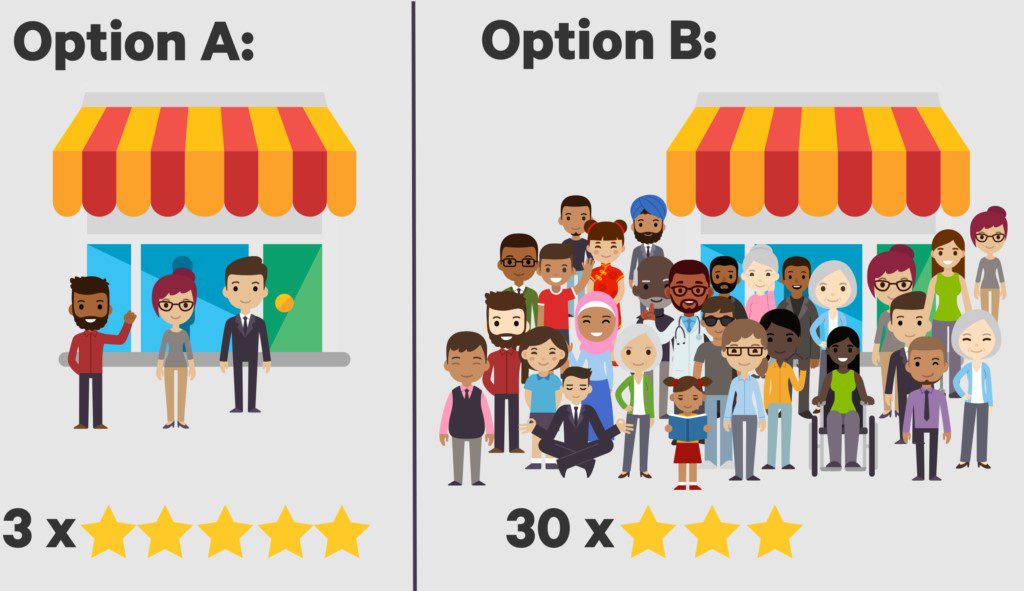
If a business has three five-star reviews, it will not build as much trust as a business that has thirty reviews that amount to a four-star rating.
Collecting reviews consistently is also a great way to mitigate the effects of the odd negative review. Even if a couple of people give you one star, the number of good reviews makes up for it.
4. Post Your Reviews Everywhere
Reviews not only build trust for the potential customer, but they also encourage people to write more reviews.
When your customers see that others have left a review for you, they are more likely to leave reviews as well.
One of our customers tested what happens if they ask for reviews and insert an existing example into the request. The result: it multiplied the number of public written responses they got.
In addition, posting customer reviews fosters customer relationships. When customers see that their feedback is celebrated, they feel appreciated.
5. Use Multiple Review Sites
According to the Local Consumer Review Survey 2024, people research online reviews diligently:
36% of consumers use two review sites when deciding to use local businesses, while 41% of consumers use three or more sites.
(If you're hungry for more statistics, check out our free resources on online statistics that'll blow your mind.)
Be mindful of which review sites are relevant for your business and make sure you are listed on all of them.
6. Treat Reviews as Conversation with Your Customers
Even though the conversation might be done openly online and your dirty laundry might be aired in public, this is a great way for you to learn what you are doing well and what you can improve.
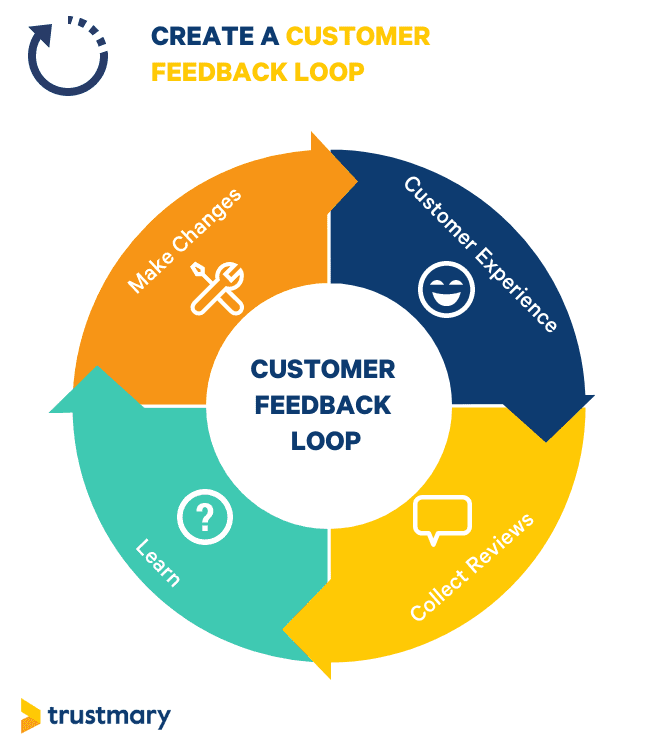
You might also be able to convince a disappointed customer to become happy again by offering great service and fixing the issues they mentioned.
Always offer your customers a way to give you feedback and remember to respond to both negative and positive feedback. This sort of open dialogue also creates transparency which make customers more likely to buy from you, as they know you are responsive and care what customers think.
If your customers feel that they are important and their opinions and worries are listened to, they are also more likely to stick with you. Collecting customer reviews is a great way to increase brand loyalty.
How to Get More Quality Reviews?
Do you want to hear the secret ingredient for getting more quality reviews?
It's all about you producing great customer experiences.
Secondly, you need to ask for them.
It seems that some people don't want to ask for reviews, as they think it's tacky or inappropriate.
This couldn't be farther from the truth!
In fact, asking for reviews should be an integrated part of customer service.
You are not the only one experiencing difficulties with reviews... We asked companies about their pain points in collecting reviews, and many businesses say they struggle with messaging, different platforms, legal aspects of reviews, and using reviews after getting them, to name a few.
The Formula to Getting Great Reviews
- Request reviews in different stages of your customer journey
- Respond to all of them in a polite manner
- Learn from the answers and improve your business
- Post the reviews (website, on-page, social media,...)
Following the formula will lead to a happier client base as they feel their opinions are valued. At the same time, it gets easier to get new customers when they can see that other people love you.
The Way You Phrase It Matters
This section can be shortened down to one sentence. Are you ready?
After your customers have bought anything from you, ask them to do you a favor by reviewing your business or the product they bought.
The secret here is that asking them for a favor lessens the feeling that they are obligated to review you. This will lead to them being more likely to review you.
No matter which review platform you are using, I urge you to try this right away. I'm confident that it'll make a noticeable difference in your answer rates.
If you don't want to spend time on review requests, take a look at these customer review templates.
Incentivizing Reviews
This is a tricky topic. In my opinion, you get the most authentic feedback and reviews when there are no strings attached. If you are using Google or Yelp and they catch you using incentives to get reviews, you'll be penalized. It's against their user guidelines.
If you're in a situation where you aren't getting reviews even though you constantly ask for them, first try to focus on improving your customer service and paying attention to which forms you are using to collect reviews.
Maybe the review platform you are using is too complicated for your target audience. Maybe people don't want to use these platforms, or maybe they don't have an account to use them.
Once people are happy with your services and you're offering them an easy way to give feedback and reviews, you'll start to get them.
You should never pay for reviews, as most review platforms will ban you if you get caught. And you will get caught.
However, there are many customer loyalty strategies you can use to try to motivate your customers to review you:
Direct Incentives
- Offer discount codes for reviewing
- Organize a lottery
- People can take part by reviewing you and you'll draw a gift card with the respondents
- Send free samples to consumers and ask for a review in return
- Give loyalty points reviewers can use in your store later
For example, ExpressionMed has tied incentives to their loyalty program. They also have plenty of user pictures, because they have made it easy for their customers to leave a picture.
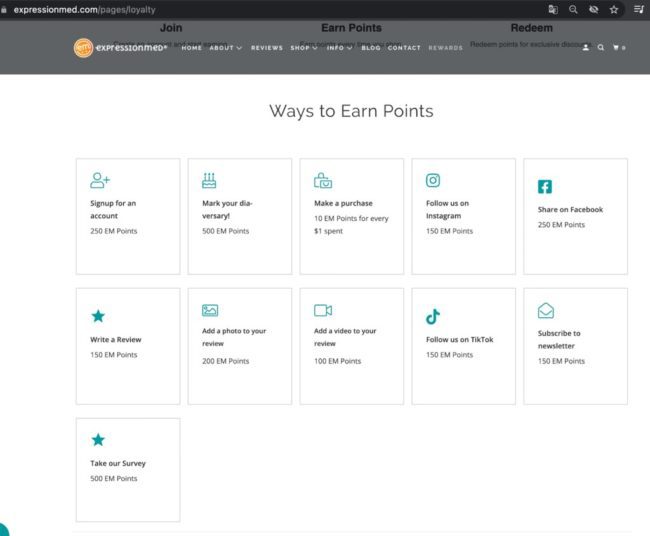
For a relatively small business, 1303 online reviews with a 5-star rating is phenomenal.
Indirect Incentives
- Give a discount code as a thank you after reviewing and without telling about it beforehand
- Getting early access to products after reviewing the previous version
Harvard Business Review experimented on how incentives affected people's reviews. In one of their experiments, they asked diners to review their meal after they had already eaten it. Half of the diners were promised a $1 Amazon gift card and the other half wasn't offered anything.
The results were mind-blowing:
- The people who received the gift card used positive language 55% more than the control group.
- The analysis was done by AI and human judges.
- They both rated the language to be 70% more positive than the reviews of the people who weren't promised anything.
This would mean that offering even a small incentive would make people use more positive language. However, if positive reviews are inaccurate, they'll possibly lead to disappointment and backlash.
If you use incentives to get reviews
- Encourage people to tell accurately about their experiences
- Give the same reward for everyone leaving a review
Find the Right Channels
Depending on what kind of reviews you want to collect, there are different options to collect reviews.
Via email
Review request emails are the most common way to collect reviews. They are easy to automate, and work well in industries where you have your customer's contact information at hand. You can also always be sure that only your real customers can open the review form.
The defect of email review requests is that they are easy to ignore, and there can be deliverability problems if you don't have the right methods.
SMS
Text messages or even WhatsApp messages are a newer way of asking for feedback. Like emails, they are easy to automate and integrate with other tools, and they often get higher response rates. This can change in the future when more and more brands start using them for review requests and satisfaction surveys.
QR code
There are many businesses that simply don't have access to the customer's contact information, such as restaurants or brick-and-mortar stores. In these cases, your chance is to collect the reviews while the customers are in your location.
QR codes or NFC stands are an easy way for you to ask for reviews and for the customer to leave them. Have these available in restaurant tables, at the counter in your shop, or next to the door so customers can scan the code before leaving.
Direct link
A simple URL link to your review form is a handy tool for e.g. social media. Just copy the link and paste it to your post or story for customers to use. Keep in mind that this method is susceptible to fraudulent reviews that aren't from your real customers.
Read our guides on how to find your Facebook review link and Google review link.
Website embed
Sometimes it's a good idea to use website embeds for your review requests, but choose the situation carefully. These are good for e.g. asking for feedback from the online shopping experience after checkout.
The Most Effective Method for Collecting Reviews
We recognize the struggle of getting feedback and reviews. People are quick to ignore your requests or abandon surveys that are too long.
If you ask for e.g. Google reviews, people don't go through the trouble of finding the right place and writing a review.
Additionally, you might have trouble with privacy regulations like the GDPR if you want to personally ask for people's reviews and also showcase them.
We have developed a process called the Trustmary Method that tackles these problems.
It's all about making the process easy for the customer and reaching them at the right time.
We use a three-in-one survey that first asks the customer for a satisfaction rating (like NPS or star rating), next asks for open feedback and thirdly collects reviews from happy customers.
Customers can decide if they want to give reviews anonymously or with their name. The review form also includes consent management, which is important to be compliant with GDPR and other privacy regulations.
Furthermore, with our review software, you can quickly get an overview of what your company's NPS is and ask for video reviews from the ones that gave you a 9 or 10. (And what would be more convincing than actually hearing the words coming from your customer's mouth or seeing a product in use?)
The method is so easy that it feels like a way to generate reviews – but the reviews are authentic and legit.
You can test Trustmary for free for an unlimited time. Click the link below ⬇️
What Types of Reviews You Need
When people think about reviews, they most probably first think about product reviews.
But reviews are so much more than that!
Let's see what types of reviews there are and why you need them.
Product reviews
Whenever I'm shopping for anything online, I often skip the description the company has written about the product and jump straight to what other consumers have said.
Product reviews focus on the quality and performance of the product. In an ideal situation, the customers writing product reviews only rate the product and don't pay any attention to possible delivery times, customer service, or any other factor that is not directly tied to the product.
When to ask for product reviews?
- First impressions: Did the product meet your expectations? Why/Why not? How would you describe your first impressions after using it?
- After a few days or weeks of using: Has it performed as well as you thought?
- Long-term use: When was the last time you used the product? Is it still living up to your expectations?
Concrete example on how to get product reviews:
Even though this example is about a physical product, the same formula can be used for services. You just need to modify the formulation of the questions to fit the purpose.
Then to the example:
Mike has ordered premium hiking shoes from the company's website.
He is asked to leave feedback:
- While receiving the shoes
- He gets the shoes and is excited. At the top of the shoe box there is a custom QR code and a text "Psst. Could you do us a small favor? Read this QR code and let us know your first impressions of our shoes! We are extremely grateful for all feedback, as it help us improve. You can describe, for example, the fit, looks, feel of the materials."
2. After two weeks of using
- Mike gets an email. "Hey Mike, thank you for your offer. You've now had the chance to try our premium hiking shoes for two weeks. Have they lived up to your expectations? You can help others find their perfect fit by giving us a product review here. It'll only take a minute of your time. We value your opinion!".
3. After six to twelve months of using
- "Hey Mike, thank you for your offer. You've now had the chance to try our premium hiking shoes for x months. Have they lived up to your expectations? How much have you used them? Is the quality still up to our high standards? It would be great if you could include a picture or a video of how your shoes look like now. All feedback help us to improve and our future customers to find their perfect fit!"
By having an optimized and automated system to collect product feedback, you'll get more and more insight on your products. Even if you get negative reviews, post and react to them. If something seems too good to be true, it probably is.
Business reviews
The term business review has two meanings which differ slightly from one another:
It can refer to:
- Periodic in-house meetings that are held to review operational performance, discuss individual or team scorecards, and to make plans for the future.
- Other people reviewing your business (often by using third-party review sites)
Obviously, in this context, we talk about the latter.
Business reviews are more holistic than product reviews. They describe how customers view your business as a whole, including aspects like customer service, trustworthiness, brand, and the overall experience.
Every business needs business reviews: even if you sell products.
You are not really building trust for your business by only focusing on product reviews. The fact is, unless you are selling unique products exclusively available in your shop, you are not convincing people to buy these products from you.
You are just advocating for the quality of the products – not for your store. I wouldn't know if your store is trustworthy, ethical, reliable, or sympathetic.
Now, I could learn more about the products on your site, and then make the actual purchase from another store that manages to convince me that they are the best choice.
Business reviews are the most important type of reviews. Go collect them right now.
Company Reviews
Company reviews refer to how current and past employees feel about working at a specific company.
Typical platforms for finding this information include:
- Glassdoor
- Quora
- Indeed
- CareerBliss
- Kununu
In addition, you can find employee experiences all over social media platforms, such as Reddit, Facebook, and Jodel.
Even though these aren't directly linked to getting more sales, having a bad reputation as an employer might cause you to lose potential talents to competitors. Furthermore, it can cause you to lose business if word goes around that you're a bad employer.
No one wants to support a business that is treating its employees badly. That being said, it's important you take matters in your own hands and start measuring eNPS and collecting employee testimonials.
Local reviews
Local reviews are reviews for businesses that have a physical location. These are especially important for local businesses doing SEO to get more visibility on search engines.
Even if you are only operating in the physical world, you need to make sure your customers can find your local business online as well.
Nowadays, people use online reviews to research all types of businesses ranging from coffee shops to phone operators.
Having recent and up-to-date user-generated content (aka online reviews) posted online will boost your search results. Furthermore, 90 % of consumers read online review before visiting a business.
Shop reviews
Shop reviews are based on the performance of the store. It includes factors such as:
- Delivery times
- Packaging
- Customer support
- General look of the store/website
It doesn't include anything about the products or services they're selling. Net Promoter Score (NPS) and Customer Effect Score (CES) are great ways to measure the customer experience of your shop.
When to ask for shop reviews?
- While people are in your physical location or on your website: "Did you find what you were looking for?"
- After purchasing: "How easy was it to buy from our store?"
- After delivering a product: "Was the package up to standards? How about the delivery time?"
- After each customer service interaction: "Were we able to solve your problem?"
Concrete example of how to get shop reviews at different stages:
Let's have a look at another possible scenario Mike might have had with the hiking shoes.
Mike visited the physical store to buy hiking shoes. He was able to try the shoes on to find his size, but the store didn't have his size in stock. Together with the personnel, Mike ordered the right size from their online store.
Mike was asked to write reviews:
- Before leaving the store with NPS
- There is a short link and QR code on the exit door and in the mirrors in the fitting rooms, which ask for general opinion about their experience with an NPS survey.
- "How likely are you to recommend a friend or a colleague to come to our store?"
- "What influenced your answer?"
- After placing the order with CES:
- "How easy (on a scale of 1-5) was it to find what you were looking for?"
- "What would have made it easier?"
- After receiving the order with NPS (CES would work as well):
- NPS: "How likely are you to recommend us to your friend or colleagues based on the delivery of your product?"
- CES: "How happy (on a scale of 1-5) are you with the delivery of your product in terms of delivery time and packaging?"
- Every time Mike has to chat with customer service he gets a link to his email:
- "How well were we able to solve you problem today?"
It's important to always offer the chance to give feedback and write reviews so that you understand your clients better.
The Most Commonly Used Review Platforms
Where should you collect reviews?
The internet is full of review sites that feature reviews for companies. They vary from general sites to more niche ones.
Having reviews on multiple platforms increases your company's online visibility and reputation.
You should choose the review sites that are relevant for your industry and location, and try to acquire reviews for all of them.
Later, you can consolidate all of your reviews with Trustmary and add them to your website.
The following section will showcase the most commonly used online review platforms for different industries.
We'll go over some general sites, as 80% of consumers look at them first while researching local businesses, while 33% of these 80% also look at niche review sites.
General / Local Review Sites
- Google Maps or Google Business Profile is the number one free review site that you should definitely be listed on regardless of your industry, and try to get more Google reviews than your competitors. We will cover Google specifically later on this list.
- Yelp is a frequently used platform for local businesses and service-based businesses, especially in the United States.
- Bing Places for Business is another local review platform and search engine, equivalent to Google Business Profile but will significantly less users.
- Yahoo! Local Listings is the third search engine that provides reviews for businesses.
- Better Business Bureau
Software and Technology Review Sites
- G2
- Capterra
- TrustRadius
Note that there are lots and lots of review sites for SaaS, software, and tech. Be careful to know which ones feature genuine SaaS customer and user reviews, and which ones make a business out of writing review articles for companies that pay them.
Travel and Tourism
If your business is in the travel and tourism industry, take a look at these travel review sites:
- Tripadvisor for resorts, attractions, and activities.
- Booking.com for hotel reviews specifically.
- Airbnb features reviews for hosts and guests alike.
- Hotels.com and other hotel directories also collect reviews from guests.
Professional Services
Those looking for highly skilled professionals in different industries might look at these review sites:
- Zillow for real estate.
- VouchedFor for finances.
- Avvo for lawyer reviews.
- Angi (previously Angie's list) got home improvement contractors.
- WebMD for healthcare providers.
Online Stores and Products
If you have an online shop or want to sell products through another platform, check out these sites:
- Amazon
- Etsy
- Trustpilot
Take a look at our list of over 50 review sites to find more examples.
Special Focus on Google
As promised, let's look at Google specifically.
Out of all the previous options, Google is the free platform that will never ask you to pay for the review service.
Also, Google is the most popular review platform for almost any business, from dentists and doctors to restaurants and plumbers. But for local businesses especially, it is a must.
Why? Because Google reviews have the power to truly boost your online visibility and rankings in Google Search. Often businesses with the most Google reviews and better star rating outrank their competitors.
Before you start collecting Google reviews, make sure your Google Business Profile is optimized.
How to Get More Google Reviews
There are no special tricks to increasing Google reviews. The same tips apply to it as to any other review platform.
All you need is a Google review link or a Google review QR code, and a good strategy for distributing them.
There might be some obstacles on the way, though:
- Not everyone has a Google account to leave Google reviews.
- Not everyone wants to leave a Google review because it is tied to their public profile where anyone can see it.
- Google reviews aren't truly anonymous.
- Some people don't trust Google reviews as much as other platforms (which might depend on culture and personal experiences).
- Google reviews can be technically unreliable and unpredictable. Sometimes they don't show up or they are hidden for no reason – which is a bummer after you have spent time and energy to collect them (or as a customer, to write them).
Because of these reasons, there will be a number of customers who would like to leave a review but can't or won't do it on Google.
That's why it's good to have a backup plan and enable those customers to review you somewhere else.
One alternative is Trustmary, as it doesn't require any logins or credentials from the customer, it's possible to leave an anonymous review, and with the same survey you can also provide the possibility to leave a Google review as well.
You don't have to choose between the two – you get both alternatives and maximize the number of reviews.
How to Use Google Reviews
There are free Google review plugins you can use to add Google reviews to your website. You could also use Google Business Reviews API and do it for free if you have the necessary skills to develop a nice widget for the reviews.
However, the easiest way to incorporate Google reviews to your marketing efforts is to use Trustmary.
You can add Google reviews to any website, including:
- WordPress (and Elementor, too)
- Wix
- Squarespace
- Shopify
- WebSite X5
- Joomla
- and many more
Trustmary has a plethora of Google review widget templates that adapt to your website with just one click.
No need for coding or design skills: everything is done for you, and new reviews can be automatically updated on your website.
How to Leverage Reviews You Get?
Once you get reviews, it's important to start using them effectively at each stage of your customer journey.
Here are some examples on how to use user-generated content divided by different stages:
Awareness stage:
- Use reviews in ads both in printed flyers and on social media
- You can even try tv ads that are based on reviews
- Share online reviews on your social media
- "See what our client Jane said about us. Thank you Jane <3"
- If you have video reviews, post them everywhere, as videos tend to convert really well
Consideration stage:
- Post reviews on your website (consider making a section for them)
- Use pop-ups and widgets on your website that show a potential customer what other people have thought about the product
- Add reviews easily to your Shopify of Wordpress environment using review plugins (like Facebook review plugin, Tripadvisor plugin, Google plugin, or Trustmary that consolidates all of that into one).
- Use them in emails as an attachment to an offer
- If you have an online shop and people added items to their cart, but left without buying. Send them an email: "We noticed that you didn't complete your order. Please let us know if you need assistance. Btw, here's what Jane thought about the products."
- On the check-out page to improve conversions. Using review videos at this stage can increase your sales by 32%.
After-sales:
- Create a community and showcase what kind of results your customers have had with your services or products: "This is how Melanie used our service/product and got the most out of it"
Aim to create value to your customers by sharing what others have thought about your products or services instead of just boasting how great you are.
Add Reviews to Your Website
So, how do you add reviews to your website?
You could do it by hand, or use Google's embed features, such as the Google trust badge, to embed Google reviews on your website.
It sounds tiring: imagine having to copy and paste individual reviews and figuring out how to make them look nice...
Luckily, there are software tools like Trustmary that make the process easy. You get stylish and customizable widgets that make reviews look amazing on your homepage, and you can showcase your best reviews automatically!
Let me tell you more about it.
1. Import Reviews from Review Sites
You can make use of your existing reviews on various third-party websites, including:
- Yelp
- Tripadvisor
- Capterra
- G2
Just register to Trustmary, choose the desired source, write your business review page URL, and Trustmary will fetch your reviews automatically.
2. Create Widget with Your Best Reviews
Now that you have imported the reviews, you get to choose the right widget for your reviews.
Check out these cool branded Google review widgets, that can of course be used with any kind of reviews.
The most popular one is the "Review Widget" as shown in the picture below:
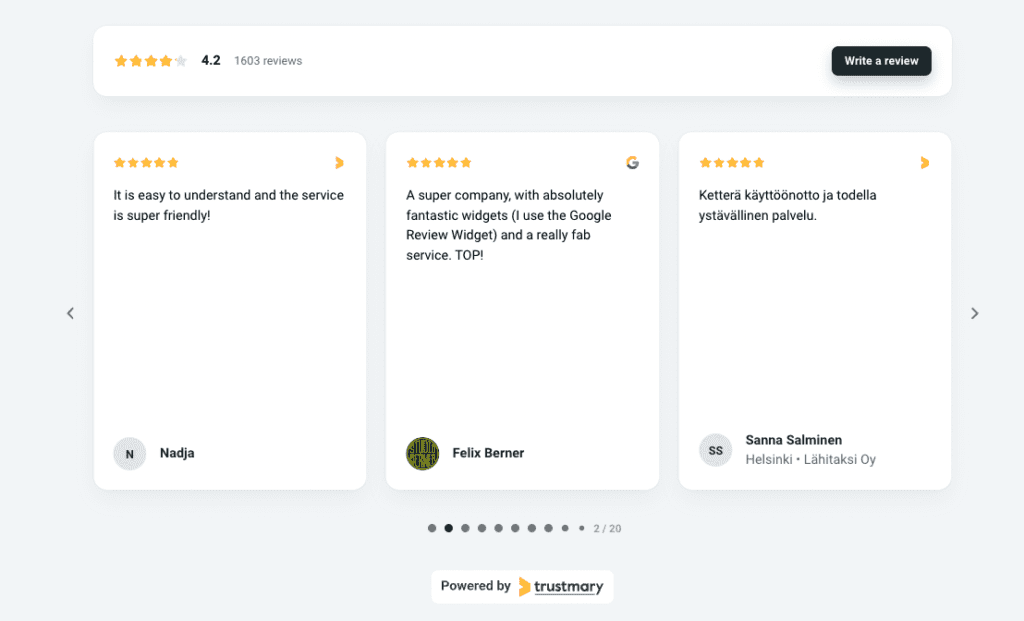
If you are happy with the simple design, you're good to go and can continue with the next step.
In case you want to spice up the widget and make it more fitting to your brand, you can!
The simple widget editor enables you to customize the colors, fonts, and other details.

Oh, and hear this: Trustmary automatically prioritizes your best reviews in the widget! The prioritization is based on following factors:
- Star rating. The higher, the better.
- Length. The longer, the more effective.
- Recency. Newer reviews are more trustworthy than older ones.
You can add reviews from multiple sources in the same widget.
3. Embed on Your Website
Now, all you have to do is to copy a code snippet and paste it to your website's backend with HTML.
Trustmary's widgets work on most website builders and CMS, including:
Whenever you have the widget on your website, you can edit it on Trustmary, and the changes are updated automatically.
There it is! Now you know how easy it is. Why not try it yourself? Importing reviews and adding them to your website is completely free!
4. Optimize Your Trustmary Review Page
All your reviews will be added to one review page under Trustmary's domain. This is like your profile that testifies your company's credibility and trustworthiness.
Thanks to Trustmary's strong domain, the page will have high visibility on Google when people search for experiences about your company.
The Trustmary review page is almost like your listing on Yelp, G2, or any other platform – except much more affordable and with all your reviews from all different platforms.
Review Management Software - Should You Use One?
It's a hassle using all the different online review sites and keeping your pages up-to-date. Your online presence is something you should be controlling.
By using a management software I don't mean you should censor any replies. On the contrary. You should be able to manage and post reviews that come from all channels. The easiest way to do this is with a centralized solution.
Worst-case scenario:
- You have one service you use for getting customer feedback
- People rate you on Google, Facebook, Yelp, Amazon, ...
- They send you raving reviews via email
- They send you feedback via social media channels (Instagram, Twitter, TikTok)
You try to desperately keep up with updating all your business accounts, monitoring online reviews, answering all reviews on each of them, adding the reviews by hand to your website (when is the last time you did this? Just asking....), analyzing the results of your annual customer feedback surveys, asking the people that approached you via email if they'd like to give you a business review that can be published,..
I'm exhausted just by looking at that list. And that doesn't even cover all the tasks that are involved. Those were just the first few I could think of at the top of my head.
To manage this crazy workload, I highly recommend using a review management tool.
3 Interesting Review Management Softwares to Consider
Here is a short introduction on three review management software that you can consider. Even though these aren't strictly for doing only review management, they are good options to do that with.
They all have many interesting individual features and I've listed a few that I found to be to most interesting.
1. Trustmary
Trustmary started in 2016 in Finland. Started out as a high-quality testimonial producer and, therefore, has extensive experience on getting and making the most out of quality reviews in general.
Most interesting features:
- Three-in-one survey for feedback and reviews (Trustmary Method)
- Video reviews
- Third-party review platform connections
- Automation options (integrate directly with you CRM like Salesforce or Firmao for best results. Native integrations, for example, with Pipedrive and HubSpot)
2. Yotpo
Was founded in 2010 and it gives the user the possibility to own and control all the content. It gives you control over how your business collects, displays and markets with user-generated content.
Most interesting features:
- Rewards Management
- Scheduled Messaging
- Trend Analysis
- Third Party Integrations
3. Sprout Social
Founded in 2010 in the US. Sprout Social is a solution with which you can track, publish, listen and report on your customer service and engagement. In short, it enables its users to control all of the most common review platforms (Facebook, Twitter, Instagram, Google+ and many more) within one tool.
Most interesting features:
- Influencer Tracking
- Editorial Calendar
- Competitor Monitoring
- Social Media Management
Conclusion on Review Management Software
As you can see, there are many differences in the solutions available even in the same category. Try to identify what it is that you want to get done with the management software to be able to choose the right fit for you.
If you have no idea where to start, I'd suggest giving one (or all three of them) a go by using their free version to figure out if that might be useful for your purposes. In case you need more software to compare these three against to, check out these 10 best review software you should consider.
No matter which review platform you use and which one you choose to manage reviews with, it's worth your while.
FAQ on Reviews
What are business reviews?
Business reviews are made by the customers of a company about how well the company is doing. This includes everything from customer service in general, possible packaging and delivery times of products to any after sales procedures.
Business reviews are more effective in building trust for your company than e.g. product reviews, which many companies heavily focus on.
What are product reviews?
Product reviews are made by people that are using the specific product. They are rating the product based on its qualities and not taking into account what the customer service of a company they bought it from has been like.
Are reviews important?
Yes, because almost every single consumer read online reviews before making a purchase.
92 % of B2B customers are more likely to buy after reading a review from a trusted operator.
Do reviews matter for small businesses?
They can make or break your business. If you serve your local customers well, they're likely to recommend you to a friend or neighbor to help you out. That same phenomenon takes place online as well, where the reviews can be read anywhere in the world. In addition, reviews (especially in Google) boost your online visibility and reputation, making it easier for new customers to find your business.
How can I get more reviews?
By asking for them at key customer touchpoints.
You have a higher chance of getting reviews if you ask your customers to do you a small favor by rating your services.
How many reviews are enough?
The more expensive the product or service is, the more people need convincing that you're trustworthy. A handful of review per product is a very good number, but the more the better.
How much work does it take to get reviews?
A lot, if you don't have an effective and automated review collection software in place. Our software based testimonial collecting tool will automate the whole process for you.
What is review management software?
Review management software is a way for you to manage your reviews in one place. You can analyze the source and contents of the reviews as well as the general happiness level of your customers. In a way, it functions as a library for all of your review content and you can also post reviews on different channels with the same tool.
What should I do with the online reviews?
- Improve your customer experience with the help of the insights you got.
- Post reviews on your website, social media, attach to offers, send out in newsletters,...
- Whatever you can come up with to spread the word on why your customers like and trust you.
Can I get more customers with reviews?
Yes, if you use them effectively. They help you build trust in your potential customers.
Should I hide negative reviews?
Never censor your reviews.
You should reply to each negative review and possibly even ask for the person's order number, so you can take it offline and fix the issue. People are looking for authentic reviews, and we all know that mistakes happen. What matters is how the company reacts in those situations.
Should I respond to reviews?
Yes! Thank the customers for leaving a review in the first place to show them that you care about each feedback.
How should I respond to reviews?
Answering politely and promptly (within the next few business days) will get you far in each situation. Talk to people as you'd like others to talk to you. After all, there's an actual human being writing to you.
